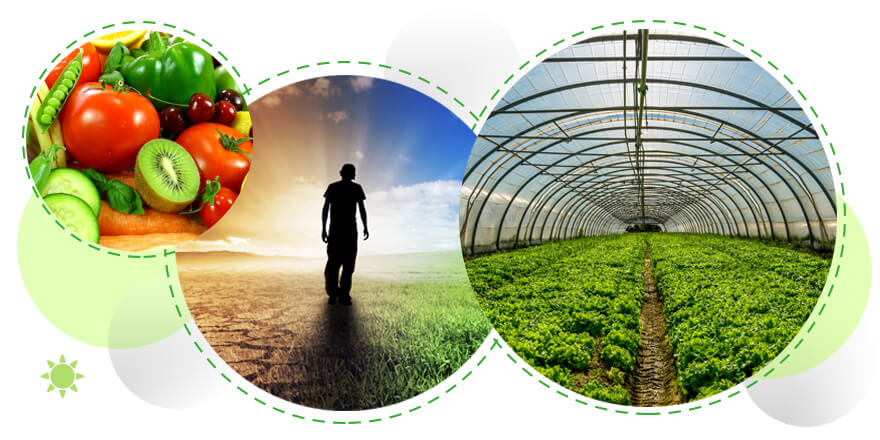
The importance of fruit and vegetable consumption in an adequate and balanced diet is supported with new studies each day. The dietary guidelines particularly emphasize increasing the consumption of fruits and vegetables, the main nutriments of the vegetarians. Different recipes of vegetable soups, fruity drinks, snack alternatives, and salads with various greens go around. All of these suggestions and efforts on creating the habit of eating more fruits and vegetables are now questioned due to a recent study. The research suggests that fruits and vegetables may be a greater cause of the climate change than meat or processed meat products. So, does that mean that the fruits and vegetables are scapegoat of the climate change and pollution on earth?
The study states that the dietary guidelines' proposal, "consume more fruits and vegetables" have a harmful effect on the environment. In short, it is suggested that more water is used in the production of fruits and vegetables (blue water footprint; the amount of water consumed from underground and ground water sources), and that it causes emissions of greenhouse gases (the amount of certain harmful gasses released in the atmosphere). Three separate types of dietary scenarios were studied in the research;
1. Decreasing the consumed calorie amount without changing any of the foodstuff in the diets (Claim: This causes a 9 percent decrease in the total amount of energy used, the blue water footprint and greenhouse gases emissions)
2. Using the American Dietary Guideline (2010) suggested vegetable rich diet without decreasing the amount of calories consumed (Claim: This causes a 43% increase in the energy use, 26% increase in the blue water footprint, and 11% increase in the greenhouse gases emissions)
3. Using a mixture of two diets proposed above, consuming more vegetables while decreasing the amount of calories consumed (Claim: This causes a 38% increase in energy use, 10% increase in the blue water footprint, and 6% increase in the greenhouse gases emissions)
So what should we make of this study?
- These results can be found through a very complex series of calculations. But the calculations may change depending on the individual who makes them, the number of people who live in that society and environmental effects. The effects of food production procedures may not be accurate or may differ with those outside America.
- According to a recent report by Food Climate Research Network based on the eating habits in England, the greenhouse gases emissions may be reduced by 17% if the suggestions of WHO are implemented. It is also stated that this ratio might increase to 40% if the consumption of fruits and vegetables are increased and the consumption of meat and meat products are reduced.
- This study was only based on fruits, vegetables, meat and dairy products. Individual preferences should also be considered when eating habits differentiate even within the same society. Certain vegetables are low in calorie content and far too much should be consumed in order to take the same calorie amount of meat. The amount of portions also differentiate among individuals. The greenhouse gases emissions of fruits and vegetables is lower than the same amount of meat consumed.
- The fruits and vegetables are part of an adequate and balanced diet. Some dietary guidelines of certain countries consider the total consumption, but some guidelines provide the vegetable and fruit consumption amounts separately.
- A report by World Health Organization (WHO) and Food and Agriculture Organization (FAO) suggests the daily consumption of 400 grams of fruits and vegetables in order to reduce the risk of non-infectious diseases. This amount is equal to nearly 5 portions of fruits and vegetables.
- According to the Dietary Guidelines for Turkey (2015, Hacettepe), consumption of 5 portions of fruits and vegetables are suggested for adults in the age of 19 and higher.
Until science proves otherwise, the importance of fruits and vegetables consumption is beyond argument in the light of these information.
References:
- Michelle S. Tom, et al. Environment Systems &Decisions. pp1-12, November 2015. Energy use, blue water footprint, and greenhouse gas emissions for current food consumption patterns and dietary recommendations in the US. http://link.springer.com/article/10.1007/s10669-015-9577-y
- http://www.fcrn.org.uk/research-library/potential-reduce-greenhouse-gas-emissions-uk-through-healthy-and-realistic-dietary
- http://www.euro.who.int/en/health-topics/disease-prevention/nutrition/activities/technical-support-to-member-states/promoting-fruit-and-vegetable-consumption
- Türkiye’ye Özgü Besin ve Beslenme Rehberi, Hacettepe Üniversitesi, Temmuz 2015.


